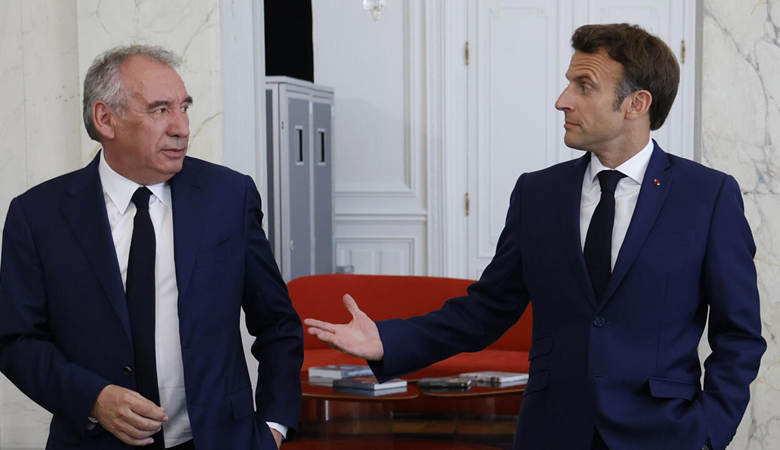France’s Macron picks Bayrou, a senior centrist ally, as prime minister.

News Mania Desk / Piyal Chatterjee / 13th December 2024
On Friday, French President Emmanuel Macron appointed Francois Bayrou as his fourth prime minister for 2024, charging the experienced centrist with navigating the country out of its second parliamentary crisis in six months.
The focus for Bayrou, a close Macron friend, will be adopting a special law to extend the 2024 budget, with a more contentious battle over the 2025 legislation looming early next year. Former Prime Minister Michel Barnier’s cabinet was brought down as a result of parliamentary opposition to the 2025 bill.
Bayrou, 73, is set to present his choice of ministers in the coming days, but he is likely to face the same challenges as Barnier in getting legislation through a hung parliament with three fighting blocs.
Jordan Bardella, president of the far-right National Rally (RN), said the party would not call for an emergency no-confidence vote, while fellow RN leader Marine Le Pen said Bayrou should listen to the opposition’s fiscal demands.The reaction to Bayrou’s appointment on the left was more varied. Communist leader Fabien Roussel stated that his party would not oppose Bayrou as long as he did not impose legislation.
However, far-left France Unbowed party leaders indicated they would seek Bayrou’s removal, while Greens leader Marine Tondelier said she would support a no-confidence motion if Bayrou ignored their tax and pension concerns. Jordan Bardella, president of the far-right National Rally (RN), said the party would not call for an emergency no-confidence vote, while fellow RN leader Marine Le Pen said Bayrou should listen to the opposition’s fiscal demands.The reaction to Bayrou’s appointment on the left was more varied. Communist leader Fabien Roussel stated that his party would not oppose Bayrou as long as he did not impose legislation.
However, far-left France Unbowed party leaders indicated they would seek Bayrou’s removal, while Greens leader Marine Tondelier said she would support a no-confidence motion if Bayrou ignored their tax and pension concerns.
France’s growing political malaise has raised worries about Macron’s ability to complete his second presidential term, which expires in 2027. It has also increased French borrowing prices and created a leadership vacuum in the heart of Europe, just as Donald Trump prepares to return to the White House.
Macron spent the days following Barnier’s departure speaking with politicians ranging from conservatives to communists in an attempt to secure support for Bayrou. The RN and France Unbowed were excluded.There was no quick response from the conservative Les Republicains party, which supported the previous government, or from Socialist Party officials, whose participation in Bayrou’s coalition may come at a high cost in next year’s budget.
Macron will hope Bayrou can hold off no-confidence votes until at least July, when France will be able to stage a new parliamentary election, but his own future as president would undoubtedly be called into question if the cabinet falls again. Bayrou, the founder of the Democratic Movement (MoDem) party, which has been a member of Macron’s ruling coalition since 2017, has stood for president three times, drawing on his rural roots as the longstanding mayor of the south-western town of Pau. Bayrou was named justice minister by Macron in 2017, but he quit only a few weeks later after an investigation into his party’s suspected illegal employment of parliamentary assistants. He was acquitted of fraud charges this year.
Bayrou’s first big test will come early in the new year, when MPs must enact a budget bill for 2025 that tightens spending. However, the fragmented nature of the National Assembly, which was turned nearly ungovernable following Macron’s June snap election, means Bayrou will most likely be living day-to-day, at the mercy of the president’s opponents, for the foreseeable future. Barnier’s budget bill, which aimed for 60 billion euros in cuts to reassure investors becoming concerned about France’s 6% deficit, was regarded too austere by the far-right and left, and the government’s failure to find a way out of the impasse has seen French borrowing prices rise even further.






